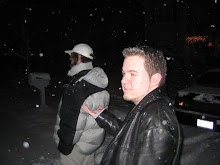I guess I was pretty excited coming into this course. I mean, it's an advanced level English course about comic books. You can't really ask for much more than that at college. Of course, I had only heard of one or two of the books on the reading list, but then again, I'm not a huge comics aficionado. I suppose I was expecting more stuff like Batman, Spider-Man... you know, comics comics (apparently Spider-Man is supposed to by hyphenated?). However, the course is called "The Graphic Novel" and not "Serialized Comics of Your Youth". That said, I didn't dislike the books we read. In fact, this was my only class this semester that I actually did pretty much all of the reading. I will say that my favorite graphic novels were the ones we read at the beginning of the semester, though. Alan Moore is one of the eminent names in comics, and Watchmen and V for Vendetta were fantastic. The book I connected the most with, though, was easily Blankets. Like many people in class, I finished it before we were supposed to because I didn't want to stop reading until I finished it. I wrote by far the most about Blankets--my later posts probably seem half-assed and disinterested by comparison. It was a beautiful story, and although I didn't like the "ending", it definitely proved to me that not every graphic novel has to be a superhero comic in order to be engaging.
That basically covers how I feel about the reading we did for this class. As to papers... Meh. They're papers; it's pretty hard to have "fun" papers. I probably came as close to enjoying writing my manifesto as I have to enjoying anything that I've written. It was rather refreshing to be able write outside of the typical academic prose that I've become so accustomed to. I got to write in first person perspective, address the reader directly (sometimes with naughty words), and pretty much break all of the rules and conventions of formal academic writing. Plus, it was an excuse to talk about two of my favorite webcomics. I don't know if my manifesto would actually convince anyone to read webcomics, but it actually got me more interested in them. So that's good. I think.
As for the final paper... I don't know. I've been having trouble with it, but that has more to do with me not being able to find the sources and research that I want than it does with the assignment itself being bogus. I will say that I found the amount of writing in this course to be very agreeable. I mean, with a course name like "Writing About Literature", you'd expect to be a writing a paper every other week, but we've only had two "papers" as such. I like the blog idea. It lets you say however little or much as you want without worrying about satisfying some arbitrary writing prompt. I bet I've done more written literary analysis in this class than any other without even realizing it because it's been in blog form rather than response papers.
Being anti-social and lazy, I'm not generally a fan of group work. In a way, having to arrange a time and date that everyone in the group can meet on to work on something probably helps me because otherwise I'd just wait until the last minute to do it if I was working by myself. The comic book wiki assignment was alright. I felt kind of silly looking up stuff about comic book characters on the internet and then posting information about them... on the internet. It was nice being able to do everything online, though. I was sick at the time that I was working on it, so I only actually met with my group once or twice. It worked out pretty well, I think. I liked the idea of making mini-comics. It gave us an appreciation of the work that goes into even the smallest of comics. Thankfully, there was someone in my group that had artistic talent and was willing to draw. I didn't like drawing when I had to do it in grade school, and I'm not about to start doing it again in college. I was impressed with the quality of some of the comics, though. Hell, ours turned out pretty well, all things considered. The one request I would make for future projects would be to always have a clearly written assignment sheet that people can refer to when starting out. People like direction and it can be a little nerve-wracking to be given little more than a general idea of what you're supposed to be doing.
The classroom environment for this course was really laid back--in a good way. I think we still got a lot of solid discussion and analysis done without the stuffiness and formality in some other classes. I'm sad to say that I've missed my fair share of classes towards the end of the semester. I feel pretty bad about that, and that's definitely something that I would change if I could do it all again--which I would, since I really liked this class overall. It's been a pretty crazy semester and I'm ready for it to be over, but I'm definitely glad that I took this class.







